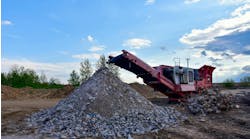By Mary Gannon
When I started working at H&P almost four years ago, I knew next to nothing about fluid power. I’d never really heard of pneumatics and about the only time I’d heard the word hydraulics, it was in conjunction with jacking cars up on the road.
Alan Hitchcox, my editor, quickly rectified this situation and gave me several lessons on fluid power — how it works, why it’s used, and the components and technology that drive it. And after nearly four years, I could honestly say I knew more than the average citizen about the technology — and it’s a good thing, since I was writing about it on a daily basis!
However, when I was promoted to senior associate editor earlier this year, a requirement of my new full-time position was to attend an Introduction to Hydraulics course at the Milwaukee School of Engineering. I flew to Milwaukee with a bit of trepidation but didn’t flounder in the course at all — I knew exactly what my instructor was talking about during each day’s lessons, enjoyed working on the hydraulic trainers that allowed me to get my hands dirty as my teammates and I built several hydraulic circuits, and answered questions about those same circuits correctly!
I’m not an engineer but it’s definitely true that we at H&P understand the importance of really knowing the technology and how it works. We have a passion for fluid power and write about it because we enjoy it. Fluid power is a fascinating technology, one that you can’t go outside your door on a daily basis and see or see something that’s been touched by it.
To provide our readers with the most interesting, correct, and up-to-date technological information, we stay up to date on the technology. We want to be your all-around provider of fluid power knowledge, from our magazine to our in-person event, the Fluid Power Conference & Expo, and from our blogs to our forums, where readers and industry experts join together to share their knowledge.
The only way the industry can advance is to have knowledgeable, educated professionals working in the field, and we believe in that so much that we, too, are willing to attend continuing education courses. I may not be an engineer, but I certainly know the fluid power industry more than most peers I have met with over the years. And that’s something we take great pride in.
This month, I researched and wrote an article about the future of the fluid power industry, which highlights some of the exciting avenues our technology may follow in the near future and how it’s going to impact us and the world in the near future. It really is exciting to be a part of this global, mature, yet constantly advancing technology, and like you readers, I look forward to always learning more.


